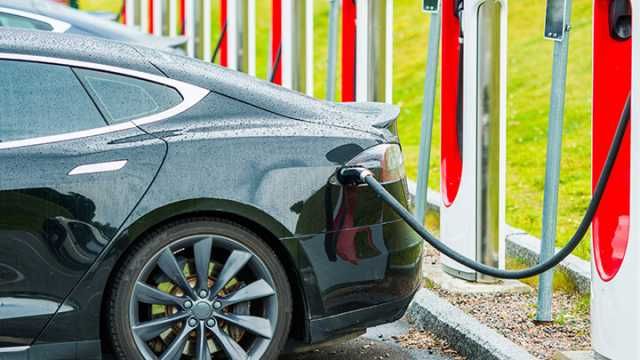
Not too long ago the idea that electric cars would be considered a “sensible” purchase for the average person would have seemed laughable. But more and more, people are considering going all-electric with their next automobile purchase.
After all, electric cars have a really smooth drive, which makes it hard to go back to a gas-guzzler. Plus, for your modern day eco-conscious consumer, making a fossil fuel-free transportation purchase is probably the best thing you can do to lower your carbon footprint.
Questions still remain about the practicality of owning an electric car, however. Often concerns over these issues are preventing people from making the all-electric jump. Let’s use the time-honored tradition of writing up a list of pros and cons of owning an electric car. We’ll see if we can determine once and for all if owning an electric vehicle is currently practical.
Pro #1: Electric cars have no need for gas
Well, this one is pretty simple. Since your car would no longer run on gasoline, there is no longer a need to purchase it. Electricity is not free, however. Electric vehicle owners can expect their utility bills to increase modestly.
Gas is not the only area in which electric vehicle owners save money. Electric vehicles do not require oil to lubricate the engine, so you can scratch oil changes off your to-do list for good. Most of the normal maintenance work performed on the engine of a gas-powered vehicle will also no longer be necessary either. Brake pads will also not need to be replaced as often. All and all, an electric vehicle is not nearly as expensive to maintain. That is a solid point in favor of owning one.
Pro #2: Reduced carbon footprint

Electric vehicles are an important step towards reducing our impact on the planet. As climate change continues to place challenges on humans and wildlife worldwide, we should all strive to live as sustainably as possible. There can be little doubt that the majority of people driving electric vehicles right now will rank this as one of their top reasons for purchasing such a vehicle.
Con #1: Range anxiety
The number one fear people have of purchasing an electric vehicle is “range anxiety,” or the fear that the vehicle will run out of juice while commuting. A study out of MIT recently showed that this fear is largely irrational, but not completely so. Turns out that 87 percent of all daily driving needs can be met with electric vehicles without the need to change driving patterns or take additional time to charge the vehicle during the day.
What about that other 13 percent? That is where things get tricky. The general range for electric vehicles starts at 40 miles. However, the new models from Tesla and BMW can travel up to 200 miles before needing a charge.
This can be problematic for long drives and road trips. While all you need to do is occasionally stop at a charging station, this can pack some additional time onto a commute. Charging times for electric vehicles vary. At a Level 3 charging station, new electric cars can be fully charged in as little as 30 minutes. That is still an additional 30 minutes to add to your drive time every 40 to 200 miles, in addition to the time it takes to get to the charging station if it is out of your way.
Access to thousands of charging stations across the United States can be found through apps and websites such as plugshare.com and the Alternative Fuels Data Center.
Con #2: Where do I plug this thing in?

For apartment and condo dwellers this snag is often preventative to owning an electric car.
While charging stations are able to provide faster battery refills, the majority of electric car owners prefer to leave their cars plugged into a regular wall socket overnight. While this route takes eight to nine hours to fully charge the vehicle, it happens while the owner is getting a solid night’s sleep after a day’s worth of smooth fossil fuel–free commuting.
Apartment buildings are often not set up for this. People who park on the street are also not able to plug in their cars overnight unless they have a long extension cord and understanding neighbors. Unfortunately, unless you have a place to plug in your car at night, owning an electric vehicle probably isn’t right for you just yet.
Unanswered questions
1. Will I look cool?
The younger readers of this article, and some of the more aesthetically driven older readers, will want to know if driving an electric car sets the right image for them. While some people believe that “cool” and “attractiveness” are subjective ideals, others disagree. They believe firmly that the answer to this question is “yes, you will look objectively cool.”
Our society’s young people have made eco-friendly decisions trendy and even fashionable (possibly their best contribution to society thus far). An electric vehicle purchase is a great way to impress your kids and their friends, allowing you to not be given a world of grief when you pick them up from school.
Should we be making consumer choices based on how trendy an item is? Absolutely not, but we do it all the time. At least current trends favor purchases that have a beneficial impact to the planet.
2. What will the future of electric cars look like?
The future of electric cars is booming. There are no signs of regression to this trend that would worry any potential electric vehicle owner. There is hardly a facet of society that isn’t preparing for the mass takeover of our transportation system. Corporations are working to build charging stations. Government programs are offering rebates of all kinds to encourage people to purchase these vehicles. New apartment and condo buildings are finding ways for residents to charge their cars in parking lots.
Society is rolling out the red carpet for electric cars. With each passing day, using an electric car is even easier than the last.
— Ian Carey

